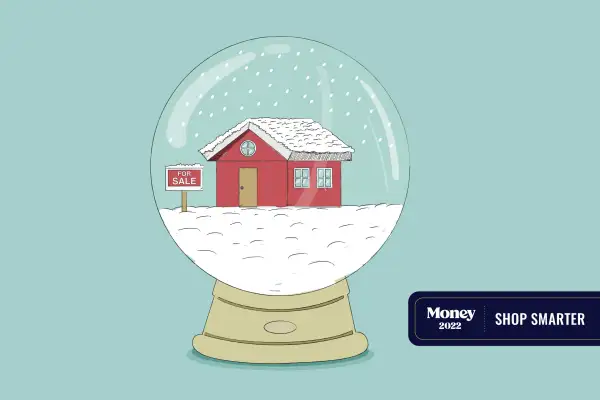Is the Housing Market Finally Cooling? A Guide to Home Buying This Winter

This article is part of Money's January 2022 digital cover, which features 22 ways to make 2022 the best money year of your life. Browse all 22 articles here.
Let’s recap, briefly, how we got here.
A record-low supply of homes for sale and near record-low mortgage rates have propelled U.S. homes prices to an all-time high. The median sales price of a single-family existing home jumped about 23% in the third quarter of 2021, hitting $363,700, according to the National Association of Realtors’ quarterly report. Those rising home prices forced buyers to duke it out for a limited number of homes.
Fortunately for buyers, the market is starting to shift. Although home prices increased in the third quarter, only 78% of 183 markets measured by NAR saw double-digit year-over-year price gains, down from 94% in the prior quarter.
The number of bidding wars has also tapered off, Redfin data shows. Meanwhile, construction of new homes is picking up and bringing some much-needed supply to the market, says Robert Dietz, chief economist at the National Association of Home Builders.
Donna Deaton, a real estate agent at RE/MAX in Cincinnati, agrees that the market is tilting in a buyer’s favor. “We’re still seeing multiple offers in a lot of cases, but what we’re not seeing is 40 to 50 offers per property anymore,” Deaton says.
Here’s what’s in store for the housing market this winter — and tips for home buyers on how to navigate the new landscape.
Mortgage rates have been rising, with the average rates on a 30-year fixed-rate mortgage increasing from 2.86% in mid-September to 3.05% by late December, according to Freddie Mac’s weekly report.
Joel Kan, an economist and industry analyst at the Mortgage Bankers Association, projects rates will continue to go up this winter. “Rates may fluctuate between now and March on a weekly basis due to volatility factors like the Omicron variant, but we expect an upward movement overall,” he says.
According to the MBA’s projections, 30-year rates will climb to 3.3% by the end of the first quarter of 2022. That’s in line with Realtor.com’s forecast, which predicts mortgage rates to close the first quarter at around 3.25%.
Kan encourages homebuyers who’ve been sitting on the sidelines to strike this winter. “Our forecast sheet has 30-year rates rising to 3.5% at the end of the second quarter and 4.0% at the end of next year, so I wouldn’t hold out,” he says.
Deaton agrees. “With interest rates as low as they are right now, you can afford to buy a little bit more house than you’d be able to if rates go up,” she says.
Mortgage pre-approval will still be a must
In this tight market, buyers should get pre-approved for a home loan before they start touring homes, says Realtor.com’s chief economist Danielle Hale. “When you find a home that you want to submit an offer on, having a pre-approval letter in hand shows sellers that you’re a serious buyer,” she says.
Another reason to get pre-approved sooner rather than later: “Talking to a mortgage lender can help you make sure that your assumptions about what you can afford are correct,” Hale says.
Indeed, “In this market there’s no such thing as ‘let’s look at houses and get pre-approved later,’” Deaton says. “You have to be ready to make an offer.”
Sellers will keep the upper hand
Although inventory is expected to increase gradually over the course of this year, “for buyers this winter, it’s still going to feel like there aren’t enough homes for sales,” says Hale. Because demand will continue to outpace supply, home sellers will still hold the bargaining chips this winter.
As a result, “buyers are [often] encouraged to make offers over list price that are not contingent on the sale of another home,” says Chris Dossman, a real estate agent at Century 21 Scheetz in Indianapolis.
In certain cases, it may make sense for buyers to waive home inspection or appraisal contingencies to beat competing bids, she adds. However, waiving such contingencies can be risky. For example, if you waive a home inspection contingency, you lose the right to make any requests for home repairs.
Before crafting an offer on a home though, “talk to the listing agent to see what the seller is looking for,” Deaton recommends. For example, some sellers may be attracted to offers with a shorter closing period because they’ve already purchased their next home, while other sellers could be looking for a leaseback agreement so they have a place to stay while they search for a new home.
In light of a recent spike in COVID-19 cases and the emergence of the Omicron variant, it’s a good idea to take steps to protect yourself (and others) during home tours and open houses. So mask up, stand at least six feet apart from strangers, and apply hand sanitizer before and after you view a home.
Some sellers will require prospective buyers to follow these measures, says Peggy Yee, a broker at NoVa House and Home in Vienna, Virginia. “For open houses, you may find some agents requiring you to sign in and provide contact info for contact tracing purposes,” Yee says.
More from Money:
5 Crypto Buzzwords Everyone Should Know in 2022
How to Convince Your Boss to Let You Work From Home Forever
From Pet Nanny to Metaverse Real Estate Agent, These Side Hustles Scream '2022'
